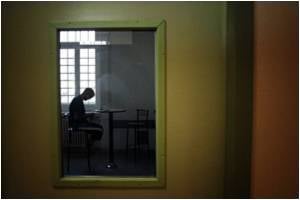
Vietnam may be gearing up for an election on May 22 in the one-party state, but the voice doesn't limit itself to politics.
Getting vaccinated, picking up pensions and even cleaning the streets -- if there's a job that needs doing, the decades-old public loudspeaker system is on hand to let the nation's 87 million inhabitants know.
"It's very annoying. We cannot stand it but we cannot do anything," said a 50-year-old shopkeeper living directly below a loudspeaker, who was afraid to give his name after making such an openly critical comment on officialdom.
First introduced in the fifties, the speakers went on to save lives with vital early warnings of United States bombing raids during the Vietnam War, but they've since been reduced to a more mundane mix of propaganda and bureaucracy.
"Long live President Ho Chi Minh, long live the Communist Party of Vietnam!" is a typical refrain at times of national importance when they tend to be more vocal, such as independence day or the ruling party's anniversary.
Advertisement
"Nobody pays attention," said Le Thi Ngoc Anh, a 22-year-old business student from the outskirts of the capital.
Advertisement
For others, the usually twice-daily announcements are not just an anachronism or a minor annoyance -- they're a source of persistent noise pollution.
"They start the loudspeakers so early, so the whole street is woken up," tailor Tran Thi Bich told AFP, as she doled out steaming bowls of pumpkin and cassava soup for her daughter and husband.
The 50-year-old, whose family home and shop is a stone's throw across the street from a loudspeaker, said it was "impossible" to get accustomed to its early morning pronouncements -- normally at around 6.30am.
"I don't know what to do. Maybe it only happens to me, others may find it nothing to object about," she sighed.
Officials, however, were quick to defend the system.
"Yes, it's old-fashioned because it's a rather poor country," said Pham Quoc Ban, director of the information and communication department at the Hanoi People's Committee, in an interview.
"We have limited financial resources so we don't have money to knock on people's doors. We have tens of thousands of people in one community and most of them are ordinary workers, so how can we disseminate information to them?"
Loudspeakers are not the only tools of the surveillance-heavy state: Vietnam is rife with plainclothes police, demonstrations are filmed, most sensitive court trials are closed to the public and authorities regularly tap telephones.
All newspapers, magazines and broadcasting media are linked to the state, with Vietnam ranking 165 out of 178 countries in a 2010 press freedom index by Reporters Without Borders, a media freedom campaign group.
Pham Quoc Ban insisted the loudspeakers were local "communication tools" and did not form part of the country's mass media, with the announcements tailored to every town quarter or village across the country.
"Other technical tools will take over eventually," he said.
The official wistfully recalled the days when the city's female speaker was "a symbol of Hanoi" during wartime, saying: "People of my generation still remember her voice."
While now irritating and irrelevant to some, others see the loudspeakers as a functional and ever-present soundtrack to their lives.
"I like hearing it, not because I listen to it so much as I have got accustomed to it. So whenever I don't hear it, I miss it. It's rather fun," said street vendor Nguyen Kim Thanh, 51, as she nibbled a snack of snails.
For most visitors to the country, the speaker system is hardly comforting -- rather a dated symbol of a propagandist and paranoid regime.
"There's no real need for that kind of information anymore," said a Western analyst, who has lived in Vietnam for 15 years.
"Why maintain the system, with wires everywhere? Maybe it's just a reminder that Big Brother is watching you."
Source-AFP








